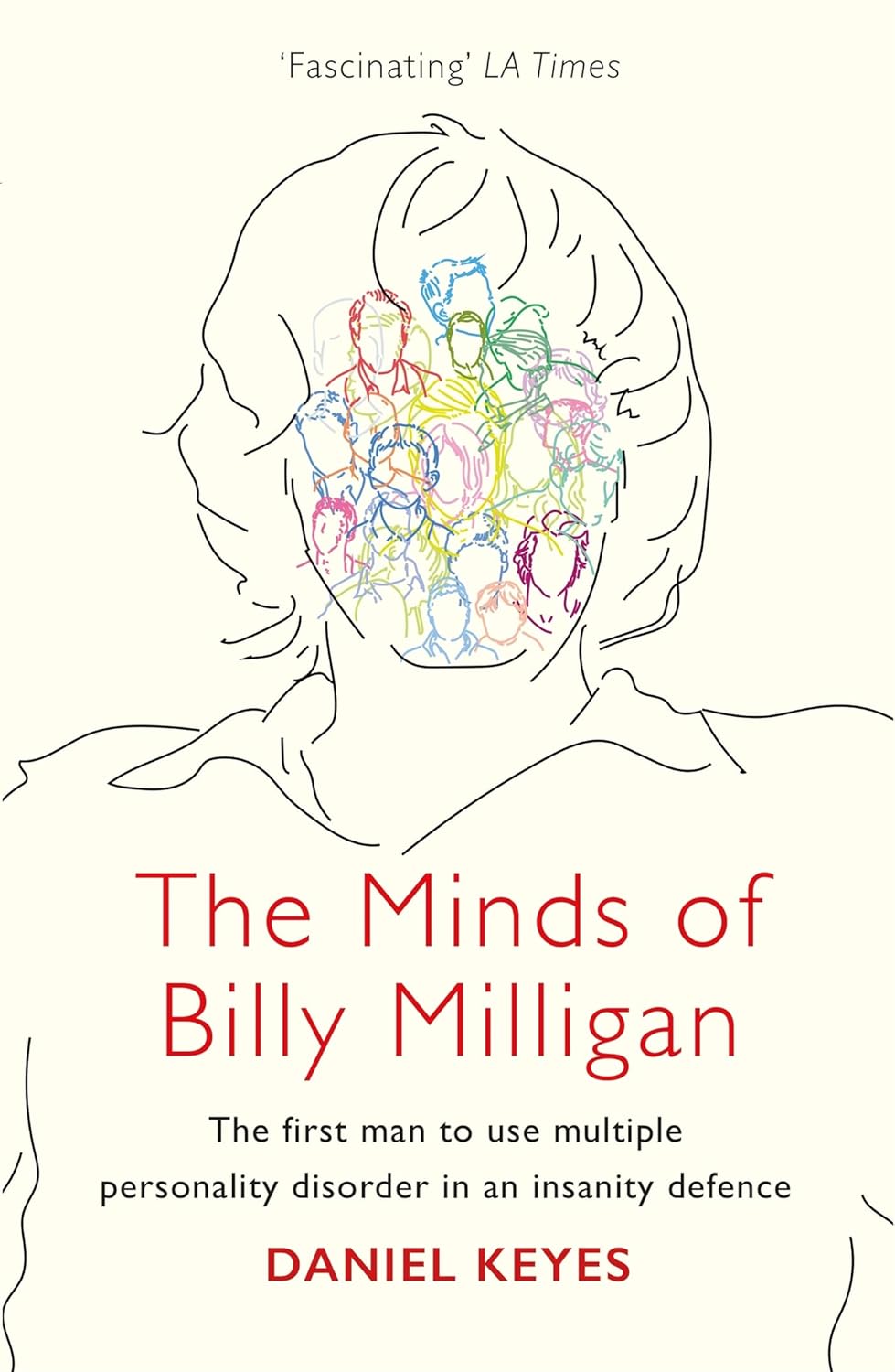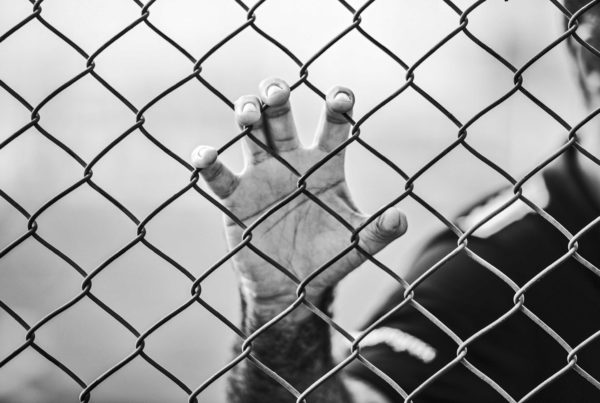
What grounds are necessary for holding a person morally responsible for their actions? While we generally acknowledge that intention, awareness, and some degree of control are relevant conditions for blame, the complicated reality of conflict often blurs these conditions. When harmful actions are carried out in situations where blame cannot be attributed with certainty, how do we balance understanding and compassion for the perpetrator with justice and closure for their victim? In 1977, confused and entirely unaware of the psychological grounds for his periodically amnesic experience, Billy woke up in a jail cell to find himself arrested for the kidnap and rape of three women.
Daniel Keyes’ The Minds of Billy Milligan is a testament to the splintered experience of living with Dissociative Identity Disorder through a biographical account of the shockingly real case of William Stanley Milligan (a.k.a. Billy). As the first man in US history to be acquitted for major crimes by reason of insanity, Billy was said to be tormented by a kaleidoscope of 24 distinct personalities. Keyes emphasises a vividness to Milligans case, documenting the identities with painstaking psychological profiling and interview-based reconstructions, with the breakdown of each personality, their language, skills, abilities, and emotional roles. The identities comprised an extensive diversity of men, women, and several children. For example: Ragan, the Yugoslavian “protector” – a weapons, ammunition and karate expert who reads and writes Serbo-Croatian, David, the 8-year old “keeper of pain” – an empath who, in his embodiment, shields him and the other personalities from emotional harm, and Adalana, the affection-starved lesbian who “used” Billy’s body to commit the rapes and kidnappings.
Naturally, Billy was, and still is, a controversial public figure. From the moment of his arrest, throughout the legal indictment, and in the way Keyes presents his post-trial years in the book, Billy continues to represent a gap in our understanding of free will and the psychology of identity. Given his extensive medical and psychological observation, the attested multiplicity by the sworn legal testimony of four psychiatrists and one psychologist, and the vast data collection involved in the making of the biography: interviews, videos and cross-confirmed recreations of memories, I personally struggle to deny the, at least partial, reality of Billy’s case.
Regardless of the reader’s personal stance on Milligan’s claim and experience, Keyes’ biography grippingly describes not only the non-fictional experience of Billy Milligan, but also builds on a carefully constructed narrative that invites the reader to question our conventional notions of moral and legal accountability; our balance of compassion and understanding with closure and responsibility. Dissociative identity disorder, among many other psychological disorders, is aetiologically believed to be a response to uncontrollable traumatic life experiences. The antisocial motivations observed in Billy’s violent crimes, whether conscious or not, were likely exacerbated and brought forward by equally, if not more harrowing, traumatic abominations to his early development of personhood and identity. In that regard, even in the case of less extreme justifications, much of our behaviour is rooted in ideas cultivated in a context we had no true control over. Our understanding of personal identity and meaning is largely infused with our cultural upbringing and our history of interactions with the people and events in our lives.
What holds a person morally accountable for their behaviour? Is it action, intention, or, if possible, a balance of the two? If action, what if error occurs and action is misguided or erroneous in its execution? If intention, to what extent is intention not warped by one’s subjective, fundamentally different perception of reality? One which just so happens to conflict with our own? How about, similar to the case of Billy, an instance where a fracture of purpose and identity may deny us of full control and awareness of our actions? If balance of the two, how is that possibly established through unbiased means? What do we choose to include and exclude in our condemnation of other people’s behaviour? Especially when we know we’re unlikely to hold ourselves to the same standards of attribution. The more we dig deep into what constitutes intentionality and the consequent moral responsibility of actions, the more we are challenged to recognise and account for the highly variable and unintentional driving forces at play, and the predisposed and consequential nature of much of our decision-making. These questions, while timeless in nature, are made immediate in The Minds of Billy Milligan, where Keyes uses Billy’s case to push the reader into confronting these philosophical dilemmas through real events, real victims, and a real man whose grasp on agency was fragmented at best.
Keyes doesn’t offer easy answers, but rather a richly nuanced portrait that forces us to reconsider what justice looks like when agency and identity are splintered. Controversial or not, what emerges most strongly for me from The Minds of Billy Milligan is that moral responsibility is not as precedent-relevant as we make it out to be. As in, the responsibility is not so much in the act itself, but the intention and actions that antecede it. Like Billy, we may not have as much insight into the roots of our intentions, or control of our actions. Even if we do, if Billy had been completely aware, our commitment to change, his compliance with institutionalisation, the recognition of not only the effect of action, but holding oneself accountable to address its driving cause, is the key that allows us to balance accountability with moral redemption.
Available at your local bookstore, or online starting from €10,49 at Bol.

What grounds are necessary for holding a person morally responsible for their actions? While we generally acknowledge that intention, awareness, and some degree of control are relevant conditions for blame, the complicated reality of conflict often blurs these conditions. When harmful actions are carried out in situations where blame cannot be attributed with certainty, how do we balance understanding and compassion for the perpetrator with justice and closure for their victim? In 1977, confused and entirely unaware of the psychological grounds for his periodically amnesic experience, Billy woke up in a jail cell to find himself arrested for the kidnap and rape of three women.
Daniel Keyes’ The Minds of Billy Milligan is a testament to the splintered experience of living with Dissociative Identity Disorder through a biographical account of the shockingly real case of William Stanley Milligan (a.k.a. Billy). As the first man in US history to be acquitted for major crimes by reason of insanity, Billy was said to be tormented by a kaleidoscope of 24 distinct personalities. Keyes emphasises a vividness to Milligans case, documenting the identities with painstaking psychological profiling and interview-based reconstructions, with the breakdown of each personality, their language, skills, abilities, and emotional roles. The identities comprised an extensive diversity of men, women, and several children. For example: Ragan, the Yugoslavian “protector” – a weapons, ammunition and karate expert who reads and writes Serbo-Croatian, David, the 8-year old “keeper of pain” – an empath who, in his embodiment, shields him and the other personalities from emotional harm, and Adalana, the affection-starved lesbian who “used” Billy’s body to commit the rapes and kidnappings.
Naturally, Billy was, and still is, a controversial public figure. From the moment of his arrest, throughout the legal indictment, and in the way Keyes presents his post-trial years in the book, Billy continues to represent a gap in our understanding of free will and the psychology of identity. Given his extensive medical and psychological observation, the attested multiplicity by the sworn legal testimony of four psychiatrists and one psychologist, and the vast data collection involved in the making of the biography: interviews, videos and cross-confirmed recreations of memories, I personally struggle to deny the, at least partial, reality of Billy’s case.
Regardless of the reader’s personal stance on Milligan’s claim and experience, Keyes’ biography grippingly describes not only the non-fictional experience of Billy Milligan, but also builds on a carefully constructed narrative that invites the reader to question our conventional notions of moral and legal accountability; our balance of compassion and understanding with closure and responsibility. Dissociative identity disorder, among many other psychological disorders, is aetiologically believed to be a response to uncontrollable traumatic life experiences. The antisocial motivations observed in Billy’s violent crimes, whether conscious or not, were likely exacerbated and brought forward by equally, if not more harrowing, traumatic abominations to his early development of personhood and identity. In that regard, even in the case of less extreme justifications, much of our behaviour is rooted in ideas cultivated in a context we had no true control over. Our understanding of personal identity and meaning is largely infused with our cultural upbringing and our history of interactions with the people and events in our lives.
What holds a person morally accountable for their behaviour? Is it action, intention, or, if possible, a balance of the two? If action, what if error occurs and action is misguided or erroneous in its execution? If intention, to what extent is intention not warped by one’s subjective, fundamentally different perception of reality? One which just so happens to conflict with our own? How about, similar to the case of Billy, an instance where a fracture of purpose and identity may deny us of full control and awareness of our actions? If balance of the two, how is that possibly established through unbiased means? What do we choose to include and exclude in our condemnation of other people’s behaviour? Especially when we know we’re unlikely to hold ourselves to the same standards of attribution. The more we dig deep into what constitutes intentionality and the consequent moral responsibility of actions, the more we are challenged to recognise and account for the highly variable and unintentional driving forces at play, and the predisposed and consequential nature of much of our decision-making. These questions, while timeless in nature, are made immediate in The Minds of Billy Milligan, where Keyes uses Billy’s case to push the reader into confronting these philosophical dilemmas through real events, real victims, and a real man whose grasp on agency was fragmented at best.
Keyes doesn’t offer easy answers, but rather a richly nuanced portrait that forces us to reconsider what justice looks like when agency and identity are splintered. Controversial or not, what emerges most strongly for me from The Minds of Billy Milligan is that moral responsibility is not as precedent-relevant as we make it out to be. As in, the responsibility is not so much in the act itself, but the intention and actions that antecede it. Like Billy, we may not have as much insight into the roots of our intentions, or control of our actions. Even if we do, if Billy had been completely aware, our commitment to change, his compliance with institutionalisation, the recognition of not only the effect of action, but holding oneself accountable to address its driving cause, is the key that allows us to balance accountability with moral redemption.
Available at your local bookstore, or online starting from €10,49 at Bol.




